|
5/11/2019 0 Comments UpdateI haven't been on here lately because since the exhibition I have been writing up the final bits of the thesis. I also took time to gather many of the folk tales I have researched to put into a book of Buckinghamshire Folk Tales [due for release in August 2019].
The writing up is great for reflecting and bringing together so many thoughts, but I must say the best bit has been the practical elements. For all the practical project put me in touch with the real-world effects of what I am doing, the writing up hides me away from the world staring at my screen for days on end. Talking of which I better get back to it.
0 Comments
1/24/2019 0 Comments ExhibitingLast night saw the exhibition of the Knowing My Milton Keynes project. A huge thanks to Rob and Liz Gifford who arranged refreshments for everyone. The library space was filled with 17 people, I was delighted as this event is taking place during StonyWords, two weeks of free literary festival events, so there were other free events people could have visited. Yes, this might be an ego boost, but it also a wonderful way to inform myself that my research that I have been slaving away at for the last two years has value beyond the realms of academic achievement, it effects real world situations and people.
I was very proud of the participants performing their stories live and was delighted to see so many people using the computer displays to watch the digital stories. Talking about the research is becoming so easy now, the Q&A at the performances was so good at focusing my thoughts and developing ways of conveying my work in no-nonsense terms. Due to slightly over-running the Q&A session was shorter than I had hoped, but it was great for the participants to be involved with that and to again reflect on the process, and also my teaching. That really is it now - Knowing My Milton Keynes practical project is done. A shame, I have really enjoyed this aspect, and would have loved to perhaps have done far more, not because the research needed it, but seeing the effect it has had on people has been incredible. Rarely do I get a chance to work so closely with people over an extended period, nor to have the feedback after a performance. The discussions as a form of critique and development have been enormously insightful for my personal practice. Now the challenge is to find ways that this sort of thing can be developed beyond the realms of the PhD, but I think perhaps write it up first and finish! 12/3/2018 0 Comments ReviewsReviews, not of my performances, but today was filled the one-to-one reviews of the participants that had been in workshops. It was great to watch back their digital stories and oral stories and let the participants review their own work, and in doing so reflect upon the process and their connection with Milton Keynes.
The great thing about it was everyone felt they had gained from the experience, which considering people were giving up their time for free was very important for me. From a researcher point of view though the most important thing was that people engaged with stories and not only developed their interest in story and the power and process of story but felt it helped their affinity with the place they live. To that end my hypothesis has been proven, although - without meaning to sound arrogant, from my experience as a storyteller sharing local heritage stories prior to the start of the PhD I had witnessed many times people finding a sense of place through stories. The true test will be if I have collected enough data, the right sort of data, to prove my theory on paper in the writing up. However, that is for another day. Today I'm just happy that the participants were pleased with their work, enjoyed the experience and have been able to see a benefit in their volunteered time. Today I will enjoy the completion of the practical project - for now at least. Next stop the exhibition! 11/24/2018 0 Comments Bye, Bye at Bar BarLast night was the last performance of the Once Upon a Milton Keynes shows, and I am finding that quite sad. I have really enjoyed going out, sharing the stories within the communities, and using the stories to generate discussions (in the Q&A sessions). It is so fascinating to see what people pick up on and also to find out how they perceive their local area, especially if they see their local as Milton Keynes or just the immediate locality.
It was interesting last night that one of my colleagues from Loughborough University made an epic journey to see the performance, unfortunately she could not stay to the Q&A for I would have been really interested in hearing what questions she might have asked. As for the performance I was thrilled with how it went. The stories just seemed to inhabit me and flow very naturally, taking form in ways which were not premeditated but seemed appropriate for the audience. I think I have found these performances tricky, far more than any usual performance I have done, principally because there seemed to be far more pressure on these performances due to them being part of the PhD. The performances carried a weight which I do not usually experience even in situations where the expectations are high. This is worth considering, because my previous experience of storytelling local heritage have all occurred outside the PhD, so has my nerves affected on the performances? This is where the auto-ethnography element comes in, my experience as a storyteller has been impacted not only by my experience as a resident of Milton Keynes, but as a researcher carrying the weight of my study into the performance. One might argue that as a professional performer I should have the skill with which to separate the researcher from the performer, and to an extent this was possible. However, as anyone who has ever done a PhD will understand, so much effort is put into the research, you live and breathe it until it is always sat in your brain, even when you aren't working on it, so that until it is complete you are always working on it. It will be interesting to speak to people who have seen me storytell before and see if they noticed any change, or whether it is one which inhabits just my emotions. Intentions even unspoken often are understood. 11/17/2018 0 Comments Stories with FriendsWow, that was a cold performance. I was warned by the Friends of St Lawrence that the church was chilly, and the 13 audience members were well wrapped up. What a day for my hot water urn to fail though, so unfortunately there were no hot beverages on hand, but plenty of stories, biscuits, and interesting questions, and luckily the venue was absolutely beautiful with its medieval wall paintings. It was a great privilege to tell the stories of Milton Keynes in such a place.
Despite the cold people the audience seemed to enjoy the stories and stuck around to engage in the Q&A session. I find it quite tricky to switch from storytelling mode to question mode, but the Q&A sessions are becoming as enjoyable as the telling because in the telling I am sharing the stories of Milton Keynes and hoping it is engaging people, but the questions I get asked show people are engaging with the stories, and further more want more information. Despite the chill the Q&A still ran to maximum time, but I was glad to pack up today and go and find warmth. Once I thaw out perhaps there will be more to be said. 11/7/2018 0 Comments Work, work, work...Another great workshop with the participants last night, but a hard one. Last night's workshop was about developing the story, considering who your audience is, where you will be telling, and how to convey the story.
A storyteller has more than just their voice to convey words, so last night we packed a lot in looking at the three key tools of a storyteller: Their body (how to use it to express points or characters, or actions, how to locate sections of the story and objects within it); their voice (the tonal range, sound effects and different character voices and whether telling from the narrator, character, or self voice) and the words they use (be it poetic, heighten, contemporary, kennings, tripling, alliteration). Participants worked hard finding some elements easier than others, but there are three distinct stories forming, each participant taking their own creative path. They have been rather ambitious with their stories and given themselves a lot of work to do. For this project they could have taken an easier path, but all have embraced a level of in-depth investigation I never expected, but one which does most demonstrate the level a working storyteller must engage with. I couldn't be more delighted with how the workshops are going, and truly looking forward to revealing the finished pieces at the exhibition. 11/4/2018 0 Comments Thank You!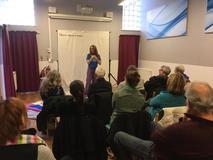 So, a little bit of a catch-up is needed. The workshops are going really well, the digital storytelling workshop produced some really good digital stories and in a surprisingly fast time. The participants, who had never done digital storytelling before, spent the morning refining their stories followed by a tutorial on how to use software. The afternoon focused on recording and editing until the finished pieces were ready to show to the group in the comments and what was produced was really positive. I'm also pleased to say the participants have now got into the full swing of journaling which is producing some really interesting data which looking I'm forward to analysing. The next workshop was the 1st to focus solely on oral storytelling. We did an exercise whereby the participants bought in a story from the local area and then told it to each other, we then swapped stories until their own story finally made it back to them in a rather altered state which created an interesting discussion about how stories change. But perhaps the biggest win of the week was yesterday's performance in Stony Stratford. 20 people turned up to be my audience which was a really nice number for the size of the room and telling to them was really comfortable they reacted well, and when I gave them opportunity to interact they fully participated. I was really pleased with the show, however we did have a few technical issues in that one camera (the older one) suddenly died halfway through the performance, and the second camera was obscured by an audience member who moved their seat to get a better view. I did succeed in getting an audio version of the entire performance and questions and answers session (the second camera giving up halfway through the questions and answer sessions). So aside from the technical gremlins it was a highly successful session with good feedback and questionnaires completed. 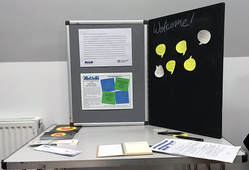 The questions and answer session raised some interesting enquiries about how modern stories differ from more traditional styles, and how our need for bite-size stories through social media and increasing time pressures in our daily lives has led to 2 very different styles of stories which was evident to the audience when they compared the folktales and histories to the urban myths and media stories. The former being longer and more poetic in language, the latter being shorter and not leaving much room for personal embellishment. We also spoke about how memories play a large part in creating modern stories and thusly generating sense of place so that even fairly new buildings and areas can quickly establish a sentimental attachment for some people. As a case in point we discussed a building known locally as the Point which is due to be demolished however it was the first multiplex cinema in the UK which was something that gave Milton Keynes a sense of pride when it first opened and is a place where a lot of people spent time with loved ones and so it has created a great deal of memories despite being part of the new town. We also discussed how using stories as intangible cultural heritage can help inform and create heritage of the future and that this, as well as trying to preserve heritage, is highly important in developing our social culture. I like to give a huge thank you to all of those who came and listened, asked questions, filled in questionnaires, and gave their feedback. You really have made a great deal of difference to my PhD. Thank you! 10/29/2018 0 Comments Tell me a story...The morning of the first workshop I was feeling quite worried, not because I wasn't prepared, but because I had only two participants sign up out of a possible five. I believe there are several factors at play here: I am asking people to give up two hours a week for four weeks, plus two one-hour meetings and a six-hour digital storytelling workshop - people would need to be really keen on storytelling or Milton Keynes to agree to this. Secondly, I think the idea of being a participant can be off putting, so can 'part of PhD research' in the advertising - for some this might conjure an image of highbrow experiments or study perhaps making it sound a bit elitist without meaning to. This research is far from exclusive or highbrow as it was designed to be inclusive and accessible to all. Trying to bring storytelling to a wider audience has always been a challenge outside of school education (and sometimes even then), this is part of the reason why I wanted to do a storytelling PhD in the first place, to add to the body of work raising awareness of the real world benefits of using storytelling in social and cultural issues, and to engage more people who might not ordinarily come into contact with storytelling to experience it and reflect upon the benefits (or otherwise) of their experience.
But whatever the reason, the image or the time, this data gathering project is an up-hill climb! With only one audience member for the first show, and with only two participants for the workshops I worried if I was ever going to get the data I needed to prove or disprove my theories. In many ways I felt a failure, like the last two years of research had ground to a halt. Then I had a wonderful idea, a terribly wonderful, awful idea. Milton Keynes is often seen as having a poor sense of place, the council even reports it, and this was my starting position for my research. Then I started interviewing and chatting to residents, and try as I might people all reported they had a good sense of place, but that they thought people in other areas had a poor sense of place, so I went to the other areas, and they all thought they had a good sense of place, but some other areas had a poor sense of place, and so on... So, then I started to muse that the biggest myth of all was that Milton Keynes has a poor sense of place. Then I started the engagement, the poor turn out seemed to back up the first hypothesis. People complain there is nothing to do, no culture, which isn't true, but then they don't turn out to things (and it’s not the advertising because social media, flyers, posters, word of mouth, and newspapers and magazines are always brimming with events). I have heard it said that only 40 people live in Milton Keynes, because depending on what circles you move in, when you do turn up to events, it is always the same 40 people you see. Fred Roche said that it is the people who are important and not the buildings. It is not that there is no culture in Milton Keynes because there are lots of people organising events and creating cultural work, it is perhaps there is too much and we have developed a blind spot and can't see what is under our noses. Anyway, as it turns out having just two participants for the digital storytelling workshop on the 27th of October (the second workshop) worked out brilliantly because it meant I was able to give them more support during the technical difficulties that arose. The workshop over ran, but because I was holding the session in my studio, we didn't have venue pressures, so we were able to be flexible to allow the participants the extra time they wanted to finish a first version of their digital stories. Although it was a tiring seven hours in the end, it was also a very creative and productive session too. So, in the end what felt like failure turned into a triumph. 10/21/2018 0 Comments One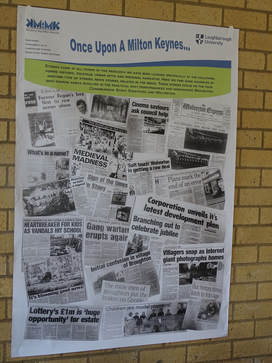 I have completed the first performance; it is great to get the first one done. I was unbelievably nervous. I managed to get to the venue early despite having to work in the morning (I teach three youth drama groups on a Saturday, and it must be said doing that helped to focus on their up-coming performances and reminded me what it is like to get a bit of stage fright). We set up the backdrop, organised the feedback area, lead out the welcome and further information/participation material, stashed the biscuits, milk, teas and coffees for the breakout session, and put up the media stories poster. This last part I created because when it came to including the media stories about the areas into the performance it proved difficult to translate this style of story into an oral format. I was also mindful that these stories may pertain to persons known in the area and with getting their first-hand account it would be easy to misrepresent the story. Therefore, I decided the inclusion of media stories whilst important to be recognised as a form of storytelling relating to Milton Keynes and its specific areas was probably best represented in poster form rather as an oral version.
When storytelling begins there is an acceptance of roles each party takes, whether teller or listener, and certain responsibilities that go with that, mostly obviously a teller will tell, and a listener will listen. There is also an acceptance that these roles can be played with once trust is built between teller and listener. When you have one person on their own you want to conduct the story in more of a conversational style rather than a set piece, this changes the dynamic of the teller and listener relationship, and in this context was difficult because where as a normal conversational story the pausing for listener's input can occur naturally, in this case it was set up in the space as a performance. It is also difficult because you end up making quite intense eye contact with your one audience member and it's difficult for that not to become intimidating on either side of the relationship.
Throughout the live performance I had to do a continual of process editing and creative adjustments, we started late waiting for or rather hoping for other audience members to arrive, but because I knew we only had a limited time in the space I knew I still had to finish at 3.45pm. Also one hour to tell to one person I felt was a bit long so I was assessing my audience throughout and when I felt that she was beginning to have enough I wrapped up the stories. In some ways all these challenges show how adaptable storytelling can be in the moment and sympathetic to the needs of the audience. On the other hand because it didn't run to plan, I can't help but feel slightly disappointed in my delivery and the lack of data generated from it. I never got that moment where I was really completely in the story, I was always very firmly in the room making the necessary adjustments for the situation, so while I feel like delivery of the stories was competent, I don't feel I did my best telling. That said, I received good feedback from my audience member, who in discussion after the performance, it turned out was on the committee for the Big Local venue and told me they had had similar issues with turnouts to events they have been running. Both my audience member and the manager of the Big Local both said that they had seen the information on social media and the posters as well as the flyers all around the area, so they did not feel that it was a lack of promotion that caused the low turnout. Maybe the lack of an audience in itself provides some data on the people in Conniburrow, my audience member adding that in the years she's lived there (since the 1980s) she has noticed how the population in the area has seen a decline in the number of families who live there and arise in landlords renting out property to multiple occupants who show little interest in the community. Without having engaged members of this community, it is hard to assess this statement and its effect. It was a hard first show but at least the first show is out the way and hopefully in the other venues I will have a higher turnout. 10/20/2018 0 Comments Its Show Time....Today is the day of the first performance. I have gathered together my resources (biography, posters, video cameras, questionnaires, I have even got up this morning and made bread so I can have a sandwich) I have and tea and coffee for those who come along, I'm yet to get the biscuits!
I have my stories, I have the comfy cushions, and I have the backdrop. And yet I still have butterflies in my stomach! I must have told thousands of stories in hundreds of venues to thousands of people and yet this event has turned my knees to jelly. Perhaps that is because it is my PhD, or perhaps it is because even though I've lived in Milton Keynes since 2013 I worry that I may be seen as the outsider gathering these stories and imposing them upon the people to whom they really belong. I like to think that if people in the audience already know the stories there'll enjoy hearing them retold and if people in the audience don't know the stories that they can take them away and share them with other people for these stories belong to the people of Milton Keynes. Most of all I worry if people will actually turn up; that I will have created flyers and posters, driven around distributing them and preparing and worrying in preparation for the event and then nobody turns up. If this is the case, I will tell to the camera and then at least I can put it on Youtube and it can go on the website so if people miss it they can catch up later. But I really hope that somebody does turn up because a story without a listener is only half the story. |
Terrie HoweySometimes known as storyteller Red Phoenix, Terrie has been a storyteller since 2004, and run her own storytelling and performing arts company since 2007. In 2016 she began a PhD in applied storytelling and heritage exploring how storytelling as heritage can impact on the sense of place experienced by residents in Milton Keynes in England. Archives
May 2019
Categories |
Search by typing & pressing enter

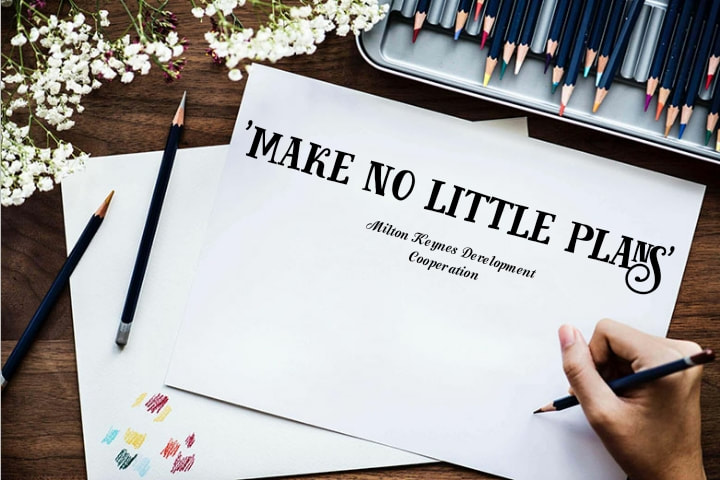
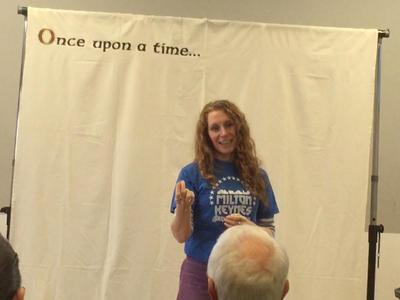
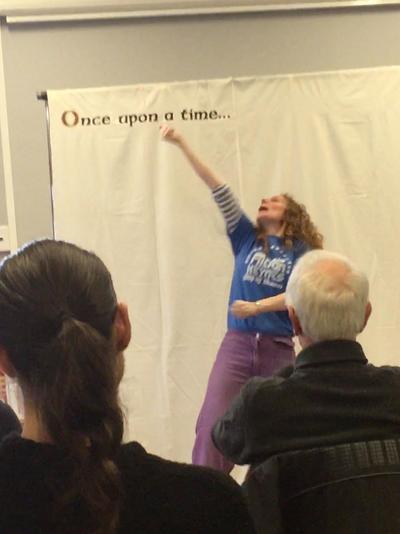
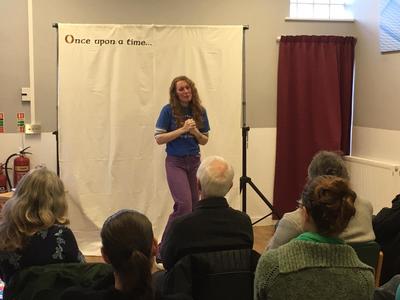
 RSS Feed
RSS Feed
